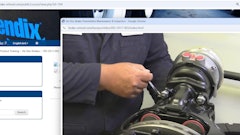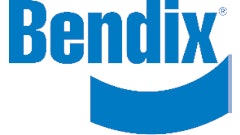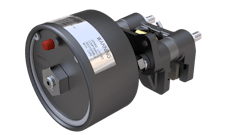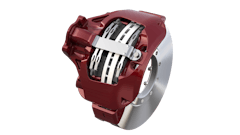Bendix Commercial Vehicle Systems LLC, the North American leader in the development and manufacture of leading-edge active safety and braking system technologies, supports the annual Commercial Vehicle Safety Alliance (CVSA) Brake Safety Week, which this year takes place September 9 to 15. Aimed at reducing the number of highway crashes caused by improperly maintained or faulty braking systems, the Brake Safety Week campaign – also known as Operation Air Brake – employs teams of CVSA-certified inspectors to conduct roadside checks of commercial vehicles and their drivers.
The program targets commercial vehicles in the United States and Canada, and is conducted in partnership with the Federal Motor Carrier Safety Administration (FMCSA).
According to CVSA, more than 30,800 vehicles were inspected during Operation Air Brake in 2011, more than any other year since the program’s inception in 1998. More than 30% of the vehicles inspected were placed out of service for reasons related to their braking systems.
“Fleets, drivers, and owner-operators have a shared responsibility to keep roadways and commercial vehicles safe for everyone. Bendix applauds and shares the CVSA commitment to Brake Safety Week and improving vehicle maintenance and inspection,” says Fred Andersky, Bendix director of government and industry affairs. “Campaigns like Operation Air Brake reinforce the importance of equipment upkeep and technician training. With CSA (Compliance, Safety, Accountability), successful inspections are more important than ever for both drivers and fleets.”
To prepare for Brake Safety Week, Bendix advises fleets and drivers to familiarize themselves with the CVSA inspection requirements and procedures. Operation Air Brake targets six items for inspection: driver’s license, registration, low air warning device, pushrod travel (chamber stroke), brake linings/drums, leaks/air loss rate, and tractor protection system.
“At Bendix, we emphasize the importance of conducting regularly scheduled preventive maintenance and pre-trip inspections,” says Gary Ganaway, director of marketing and global customer solutions for Bendix Spicer Foundation Brake LLC (BSFB). “For Operation Air Brake, pre-trip brake inspections take on added importance. We suggest that drivers test for leaks, examine brake shoes, and measure chamber stroke in accordance with Technology and Maintenance Council (TMC) and industry standard practices.”
BSFB is a joint venture between Bendix Commercial Vehicle Systems LLC and Dana Commercial Vehicle Products, LLC.
To check for leaks, Bendix suggests a 90 to 100 psi brake application, followed by a walk-around inspection of the vehicle, while listening for audible leaks. The CVSA inspection will also test the vehicle’s low air pressure warning device, and, if a leak is detected, measure the air loss rate.
Brake shoes should be examined for cracks and checked to ensure they meet the minimum lining thickness standards.
To measure the chamber stroke on each wheel-end, Bendix typically recommends checking the distance from the chamber to the pin with the brakes released, and again after a fully charged brake application. Drivers can incur fines if the difference between the two measurements – the chamber stroke – is outside allowable limits on 25% of a truck’s wheel-ends.
For foundation drum brakes, fleets should follow the manufacturer’s instructions regarding the adjustment of slack adjusters.
In conducting general wheel-end inspections, Bendix emphasizes close attention to the rubber boots on brakes, where cracks or tears could allow moisture to get inside.
As safety requirements evolve and commercial vehicles continue to advance technologically, regularly scheduled preventive maintenance, along with continued driver and technician training, will become even more vital to the industry.
“Proper brake adjustment and maintenance are more important than ever to commercial vehicle and roadway safety – especially with the first phase of new Reduced Stopping Distance requirements implemented in 2011, and the second phase set to take effect in 2013,” Ganaway says. “We also strongly advocate maintaining brake systems with original equipment replacement parts specifically engineered for today’s higher performing drum brakes. Choosing non-OE replacement brake lining or slack adjusters, for example, can significantly reduce performance, creating a safety hazard or leading to noncompliance.”
Bendix provides commercial fleets, technicians, and drivers with the tools they need to ensure safe operation through assessment, maintenance, and repair. The company offers field-tested sales and service professionals; a 100% ASE-certified field technical support team; and the Bendix Tech Team, an expert technical support phone line, among other tools. The Bendix Brake Training School, one of the industry’s longest-running training programs, has educated more than 250,000 students since its founding more than 50 years ago.
![Sa P75 I Sahr[80]](https://img.oemoffhighway.com/mindful/acbm/workspaces/default/uploads/2025/10/sa-p75-isahr80.Cn3n79HB4H.jpg?auto=format%2Ccompress&fit=crop&h=100&q=70&w=100)



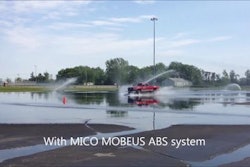
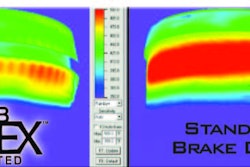

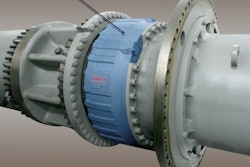
![Sa P75 I Sahr[80]](https://img.oemoffhighway.com/mindful/acbm/workspaces/default/uploads/2025/10/sa-p75-isahr80.Cn3n79HB4H.jpg?ar=16%3A9&auto=format%2Ccompress&fit=crop&h=135&q=70&w=240)



